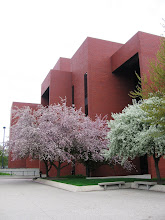Authentication at Public Computers Implemented at BSU Libraries
Ball State’s University Libraries provide access to approximately 350 public workstations. These computers provide access to software productivity applications that are essential to students, faculty, staff, and the public for completing assignments and conducting research. They also are the instruments used for accessing global academic resources for research, learning, and classroom teaching, making them strategic for creating a learning environment in which data-informed instruction and discovery can thrive to increase student achievement.
The academic community relies on access to quality productivity software and on the availability of digital resources through newtwork access. Yet, the University Libraries’ objective of integrating library services and computer applications has been challenged repeatedly by the increasing frequency of malicious viruses, worms, and the potential/liability of the disruptive use of shared technology.
To overcome this barrier, at the beginning of Fall Semester 2004, the University Libraries began to use the Ball State University domain for authentication, requiring the user to provide credentials such as user-name and password to access workstations.
Today, some institutions use strong passwords (i.e., a long string of characters using letters, numbers, and special characters). Others are improving their security and authentication strategies by implementing digital authentication involving the use of token-based Public Key Infrastructure (PKI) devices as part of their security practices. According to Dr. Arthur W. Hafner, Dean of University Libraries, the purpose of undertaking security measures was to improve accountability, develop responsible use, and augment security of public access technology.
There are several highly useful benefits achieved by requiring the University Libraries’ customers to log-on to access the network to identify themselves as members of the Ball State community. Some of these are the following:
· Increased accountability of technology resources
· Discouragement of disruptive use of workstations
· Improved network security
· Facilitation of making more computer applications available, while complying with campus software agreements/licenses with vendors
· Improved cost accountability for the use of digital resources
· Improved compatibility with the University Computing Services’ campus computer developments and objectives
· Improved compliance with copyright and license requirements, as necessary
· Automatic connection to the iLocker storage server for 2 GB of free file storage space for each student and faculty proved by Ball State University
· Improved print job identification in the VendPrint print management system
· Easier access to file shares on servers around campus for GIS and other program applications
The University Libraries have a strong history and rich tradition of providing access to resources for members of the communty at large. Visitors who are not directly affiliated with Ball State University, for example, may request a Guest Account which allows acccess to the University Libraries' public workstations for the balance of the day that it is issued.


0 Comments:
Post a Comment
<< Home